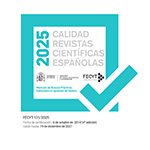Will of Empire. Hispanidad in fascist thought during the Second Spanish Republic
Abstract
This research studies the influence that the ideas incorporated by the authoritarian monarchism in the Hispanidad doctrine had in the thought configuration of Spanish fascism in the context of the Second Republic. Hispanidad as a neo-traditionalist interpretation of history and an anti-liberal project was taken up almost entirely by the nascent groups close to fascism, which in this way served as an ideological link with a radical right from which, however, fundamental differences separated them. In this study we have pointed out the two main discrepancies between the concept of Hispanidad of neo-traditionalism, represented to a large extent by the counterrevolutionary group of Acción Española, and the various representative movements of Spanish fascism: the Catholic element as the inseparable essence of Spanish being and imperial aspirations. To develop this idea and demonstrate it, we have used a set of sources, among which the essays and periodicals of the time in which these conceptions were formulated and disseminated stand out.
Downloads
Article download
License
In order to support the global exchange of knowledge, the journal Cuadernos de Historia Contemporánea is allowing unrestricted access to its content as from its publication in this electronic edition, and as such it is an open-access journal. The originals published in this journal are the property of the Complutense University of Madrid and any reproduction thereof in full or in part must cite the source. All content is distributed under a Creative Commons Attribution 4.0 use and distribution licence (CC BY 4.0). This circumstance must be expressly stated in these terms where necessary. You can view the summary and the complete legal text of the licence.











